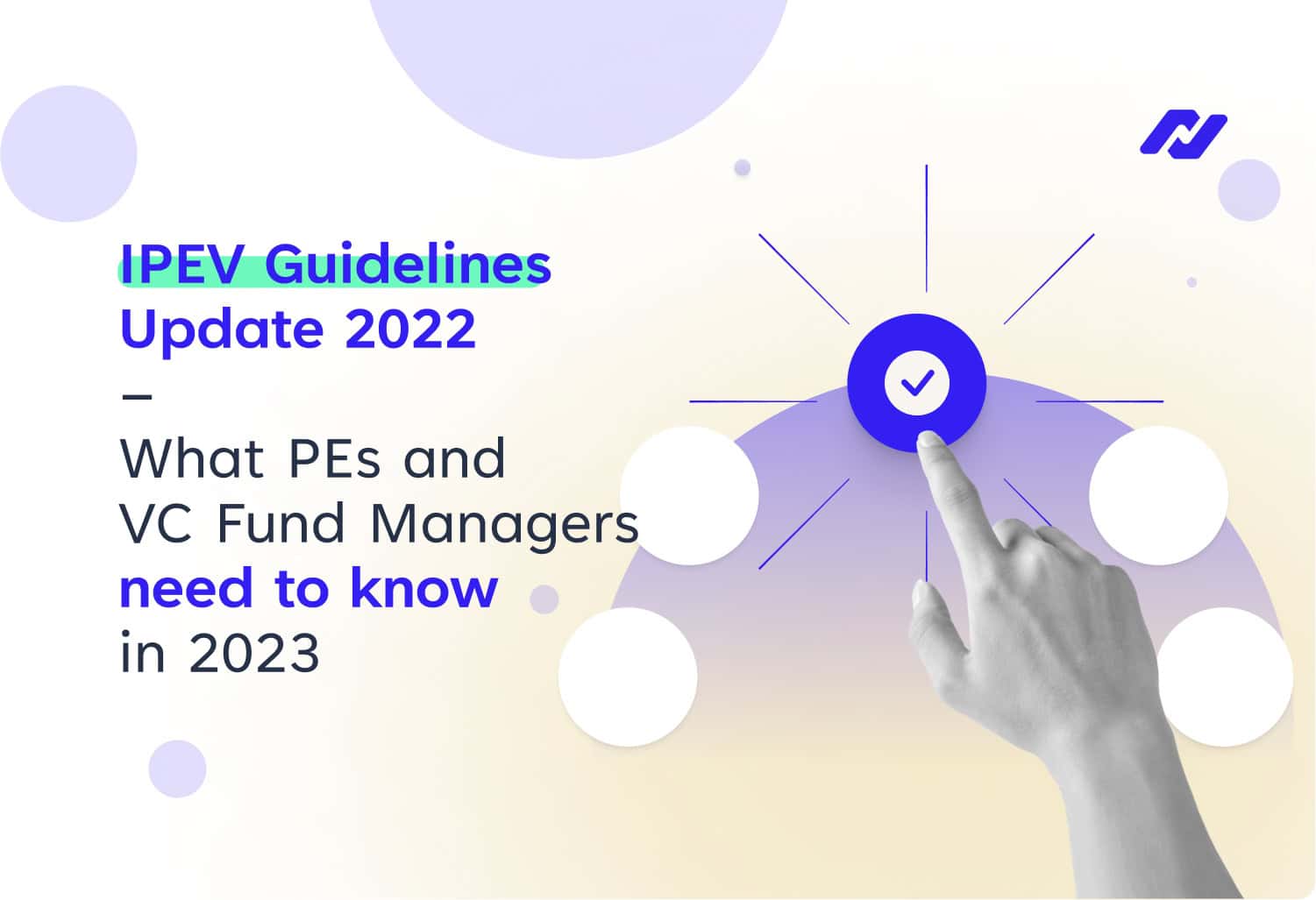In the ever-evolving landscape of Private Equity (PE) and Venture Capital (VC) investments, accurate valuation of assets has become paramount. Investors, regulators, and stakeholders alike rely on valuation guidelines to ensure transparency and trust in the work of General Partners (GP). The International Private Equity and Venture Capital Valuation (IPEV) guidelines, a globally recognized standard, underwent a significant update in December of 2022, which is to be considered effective starting January 2023. This blog post delves into the 2022 IPEV Guidelines update, its key changes and impacts and their implications for fund managers.
The IPEV Guidelines: A Brief Overview
The IPEV guidelines are a set of globally accepted best practices for valuing assets in PE and VC funds. They offer consistency, transparency, and comparability in the valuation of illiquid investments. Since their inception in 2005, the guidelines have been revised periodically to address the evolving industry landscape and challenges. And compliance with most recent IPEV guidelines is required by large funds such as Invest Europe and the European Investment Fund (EIF).
Key Changes brought by the 2022 IPEV Guidelines Update
Improved Governance and Disclosure
The 2022 IPEV Guidelines update contains new guidances on the governance and disclosure duties of fund managers, which has potentially the largest impact on the day to day work of VC and PE funds. Due to the updated guidelines, funds may need to review their valuation policies and procedures to ensure that they are consistent with the expectations outlined by the new IPEV guidelines. Relevant updates include:
- Incorporation of a comprehensive valuation policy
- Regular documentation of valuation rationale
- Processes to challenge valuation assumptions and key inputs
- Documentation of independence in the valuation process
- Consistent approach in determining the assets’ fair values by assessing:
- Accuracy and completeness of information and data used in the valuation
- Managing conflicts of interests
- Compliance with valuation guidelines such as IPEV
Enhanced Focus on Market Data and Guidance on Distressed or Dislocated Markets
Another one of the most significant changes in the 2022 update is the emphasis on market data. The revised guidelines stress the importance of using market-based evidence when available, ensuring valuations are as close to market realities as possible.
In addition, the IPEV board has added guidelines on how to account for times of geopolitical or macroeconomic distress and dislocation within markets, underlining that the premise of fair value should remain the same by retaining consistent valuation processes.
Valuation of Early Stage Companies
The task of valuing early stage companies such as startups at the seed stage can prove to be difficult and require more detailed analyses. Already in the 2018 guidelines, IPEV stated that the “Price of Recent Investment” should not be used as a stand-alone valuation technique, but instead be considered as a benchmark for different following valuation models. Adding to that, the new guideline update suggests further analysis of early stage companies should consider other qualitative factors and value indicators, e.g. cash burn rate, company strategy etc. that are more appropriate such investments.
Treatment of Known or Knowable Information
Information that has been received after the valuation date can impact the valuation significantly, thereby influencing the work and potentially the trustworthiness of fund managers. After previous confusions regarding the relevant section of the guidelines, the new IPEV update clarifies the treatment of information received after the valuation date. According to the update, the valuation only includes the information known or knowable at the date of valuation.
Adjustment of Enterprise Values (EV)
In the 2022 update, IPEV provides new comprehensive guidance on adjustments and factors that are to be taken into consideration when estimating an asset’s equity value from its EV. The new guidelines for EV adjustments now include and further address factors such as steady state working capital, excess cash, surplus assets and liabilities as well as ESG factors.
Integration of ESG Factors
Tying into the updated guidance of EV adjustments, the 2022 IPEV updates include guidance on the integration of ESG (Environmental Social Governance) factors into the process of asset valuation. Due to the increased focus on ESG factors by investors, regulators and governments, funds are encouraged to communicate responsible investment practices and include ESG factors into the valuation. Potential factors could include e.g. projected cash flow or earnings impacts from ESG actions taken or the likelihood of governmental action impacting the business model of the asset.
Implication of Different Rights and Share Classes in Capital Structures
The revised guidelines, effective as of 2023, also provide further guidance on the consideration of different share classes and the implication of different rights, risks and return expectations attached to them. Within their updated guidance, IPEV recommends the use of option-pricing models or other scenario-based models.
Assessment of Appropriate Valuation Multiples
Further guidance has also been provided for the valuation of companies using multiples. The updated guidance for 2023 comprises further information on peer group selection criteria and the reflection of the used criteria within the valuation. Furthermore, the new guidelines recommend that, once a fitting peer group is established, it should be maintained for future valuations, unless contrary information becomes available.
Implications and Challenges for PE and VC Fund Managers
Given these significant updates within the IPEV guidelines, fund managers will need to adapt their valuation practices to align with the new guidelines in order to comply with the requirements of their investors. Potential steps and resulting challenges could be:
1. Comprehensive Review of Valuation Policies:
In a very first step, fund managers should review their current valuation and reporting policies and procedures as well as their valuation governance, in order to evaluate whether or not they are in line with the updated 2022 IPEV guidelines.
In case of a deviation between the IPEV guidelines and the currently established policies, further necessary steps can be taken.
2. Accurately Reporting Changes in Fair Value on a Recurring Basis
Accurate and timely reporting of changes in fair value is a critical aspect of the revised IPEV guidelines. To do this effectively, fund managers need to establish robust reporting mechanisms that ensure consistency and transparency. It is essential to consistently monitor indicators that change the fair values of portfolio companies in order to adjust the valuation and report the changes to the funds investors. Potential indicators could include:
- Significant deviations between the assets planned and actual financial performance
- Changes in the timeline of relevant development milestones
- Shifts in the market and macroeconomic environment
- Significant changes in the performance and valuations of peer groups
- Significant changes in internal matters (e.g. litigations or disputes) that effect valuation
Ignoring factors such as these might lead to inaccurate reporting of assets’ fair values.
3. Incorporating Adequate Governance
Starting 2023, the revised IPEV guidelines place a significant emphasis on the valuation governance of funds to ensure that valuation processes are conducted fairly and transparently. Although fulfilling these operational requirements of IPEV represent large monetary and timely expenditures for funds, the following steps could be considered in order to implement sufficient valuation governance:
- Formulating a valuation policy, with the processes and methodologies used to determine the fair values
- Documenting all inputs, assumptions as well as the valuation rational at the time of the valuation date
- Forming an independent internal committee or engaging external advisers with relevant expertise to provide an unbiased assessment of valuation policies and results
- Incorporating backtesting and including periodic audits of the valuation processes
4. Applying Revised Fair Value Principles
The 2022 IPEV guidelines introduce several updated fair value principles to improve the consistency and accuracy of valuations. As the calculation of fair values require the consideration of additional (e.g. ESG) factors and characteristics in order to ensure accurate reporting of valuations, fund managers should adapt their practices accordingly and take into account the following considerations:
- Using adequate valuation approaches, matching the new guidance provided by IPEV
- Accounting for market movements and distress by using market-based inputs
- Taking into consideration qualitative factors as well as the development stage of assets and the resulting implications on different share classes
- Including available information about larger macroeconomic as well as asset-specific uncertainties
- Using peer groups and peer group selection criteria in accordance with the new guidelines
- If necessary, adjusting EVs of assets for the newly specified factors
Conclusion
The 2022 update to the IPEV valuation guidelines, effective as of January 2023, brings crucial changes that reflect the evolving landscape of private equity and venture capital investments. These changes aim to improve transparency, consistency, and accuracy in valuation processes. Fund managers need to embrace these changes, adapt their practices, and communicate effectively to maintain trust and confidence among investors and stakeholders. By understanding and implementing the updated IPEV guidelines, fund managers can ensure that their valuation practices meet the highest standards of integrity and transparency.
However, upholding the new IPEV standards in 2023 demands for increased focus of fund management teams on valuation and documentation, requiring the scarce resource of time. In order to support the management teams of funds with the challenges of the updated guidelines, trustventure offers its services.
Valuation excellence made easy: Partner with us for IPEV Guidelines compliance!
Partnering with trustventure allows funds to benefit from increased investor trust in the performance of the fund by complying with widely accepted guidelines, less demand for the management to deal with the compliance by utilizing external capacities, as well as improved accuracy in the recurring valuation processes.
To provide these benefits, trustventure offers either initial support by helping to prepare relevant governance documentation, or continuous support with ongoing reviews of existing valuations within the portfolio and necessary valuation adjustments. Furthermore, trustventure offers ad-hoc support by preparing valuations or fairness opinions for investments, M&A transactions, exits, etc.












